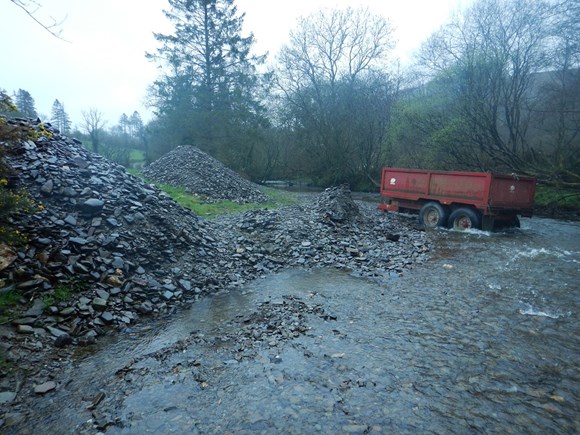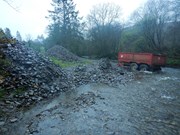
18 May 2021
Rivers at risk from gravel removal and channel alteration

NR-05-NRM-MG
Illegal work taking place on watercourses continues to have a negative impact on the animals, fish and plants that make their home in and around Welsh rivers and streams.
Natural Resources Wales is calling on landowners not to undertake unconsented work to streams and rivers following an increase in the number of reports of damage caused by gravel removal, reprofiling of banks and straightening channels across Wales.
These activities can destabilise rivers, causing changes to erosion and deposition processes and potentially increasing flood risk.
Healthy watercourses are a vital component of the Welsh landscape and are home to many species, some of which are very rare, so any disturbance can have serious consequences.
Altering river channels can destroy fish habitat and bird nesting sites, disturb protected species and cause the spread of invasive non-native species such as Japanese knotweed and Himalayan balsam.
Hilary Foster, specialist advisor for freshwater habitats and species for NRW said:
“Protecting our rivers and the wildlife that depend on them is a priority for us.
“We are continuing to receive reports of damage to rivers caused by gravel removal, reprofiling of banks and straightening channels and are progressing enforcement action on those cases.
“Any work that is carried out on a river or stream will affect the characteristics of the channel both upstream and downstream, and river channel alterations carried out by one landowner can potentially cause problems over considerable distances for their neighbours.
“Alterations to watercourses should be limited to situations where there is a clear justification such as alleviating flood risk to nearby buildings. You will also require a permit or consent from NRW or the Local Authority in most cases.”
Wales has lost more than 50% of its vitally important river gravel shoals over the last century.
Gravel shoals support more than 500 species of invertebrates, half of which are only found in these shoal habitats. River gravels are also essential for fish and are a key feature of a healthy river ecosystem.
Hilary added:
“If you are considering undertaking any work on a watercourse you should contact NRW for advice. We will provide information on any necessary permissions and measures to avoid environmental harm.
“If you do not consult NRW prior to undertaking works on a river or stream, you are at risk of committing an offence. Enforcement measures may include the requirement to restore the damaged habitat”.
For more information please call NRW on 0300 065 3000 or email enquiries@naturalresourceswales.gov.ukIf you see or suspect that someone is working in a river illegally, please call NRW’s incident hotline on 0300 065 3000.
..............................................................................................................................................................................................................
Afonydd mewn perygl yn sgil tynnu graean a newid sianelau
Mae gwaith anghyfreithlon sy'n digwydd ar gyrsiau dŵr yn parhau i gael effaith negyddol ar yr anifeiliaid, y pysgod a'r planhigion sy’n byw yn afonydd a nentydd Cymru ac o'u cwmpas.
Mae Cyfoeth Naturiol Cymru yn galw ar dirfeddianwyr i beidio â gwneud gwaith heb ganiatâd ar nentydd ac afonydd yn dilyn cynnydd yn nifer yr adroddiadau am ddifrod a achosir gan dynnu graean, ailbroffilio glannau a sythu sianelau ledled Cymru.
Gall y gweithgareddau hyn ansefydlogi afonydd, gan achosi newidiadau i brosesau erydu a dyddodi a chynyddu'r perygl o lifogydd o bosib.
Mae cyrsiau dŵr iach yn elfen hanfodol o dirwedd Cymru ac maent yn gartref i lawer o rywogaethau, rhai ohonynt yn brin iawn, felly gall unrhyw aflonyddwch arwain at ganlyniadau difrifol.
Gall newid sianelau afonydd ddinistrio cynefinoedd pysgod a safleoedd nythu adar, tarfu ar rywogaethau a warchodir ac achosi lledaeniad rhywogaethau estron goresgynnol fel clymog Japan a Jac y Neidiwr.
Dywedodd Hilary Foster, sy’n gynghorydd arbenigol ar gyfer cynefinoedd a rhywogaethau dŵr croyw ar gyfer CNC:
"Mae diogelu ein hafonydd a'r bywyd gwyllt sy'n dibynnu arnynt yn flaenoriaeth i ni.
"Rydym yn parhau i dderbyn adroddiadau am ddifrod i afonydd a achosir gan dynnu graean, ailbroffilio glannau a sythu sianelau ac rydym yn bwrw ymlaen â chamau gorfodi ar yr achosion hynny.
"Bydd unrhyw waith sy'n cael ei wneud ar afon neu nant yn effeithio ar nodweddion y sianel i fyny ac i lawr yr afon, a gall newidiadau i sianelau afonydd a wneir gan un tirfeddiannwr achosi problemau dros bellteroedd sylweddol i'w gymdogion.
"Dylid cyfyngu newidiadau i gyrsiau dŵr i sefyllfaoedd lle mae cyfiawnhad clir fel lliniaru'r perygl o lifogydd i adeiladau cyfagos. Byddwch hefyd angen trwydded neu ganiatâd gan CNC neu'r Awdurdod Lleol yn y rhan fwyaf o achosion."
Mae Cymru wedi colli mwy na 50% o'i basleoedd graean hanfodol bwysig mewn afonydd dros y ganrif ddiwethaf.
Mae basleoedd graean yn cefnogi mwy na 500 o rywogaethau o infertebratau, a dim ond yn y cynefinoedd hyn y ceir hanner ohonynt. Hefyd, mae graean afonydd yn hanfodol ar gyfer pysgod ac yn nodwedd allweddol o ecosystem afon iach.
Ychwanegodd Hilary:
"Os ydych yn ystyried gwneud unrhyw waith ar gwrs dŵr dylech gysylltu â CNC am gyngor. Byddwn yn darparu gwybodaeth am unrhyw ganiatâd a mesurau angenrheidiol i osgoi niwed amgylcheddol.
"Os nad ydych yn ymgynghori â CNC cyn gwneud gwaith ar afon neu nant, rydych yn mentro cyflawni trosedd. Gall mesurau gorfodi gynnwys y gofyniad i adfer y cynefin a ddifrodwyd".
I gael rhagor o wybodaeth ffoniwch CNC ar 0300 065 3000 neu e-bostiwch enquiries@naturalresourceswales.gov.uk. Os ydych chi'n gweld neu'n amau bod rhywun yn gweithio mewn afon yn anghyfreithlon, ffoniwch linell gymorth digwyddiadau CNC ar 0300 065 3000.
Contact Information
Communications Team
Natural Resources Wales
communications@naturalresourceswales.gov.uk
Notes to editors
PIC CAP: Unauthorised work is having a negative impact on Welsh rivers.

